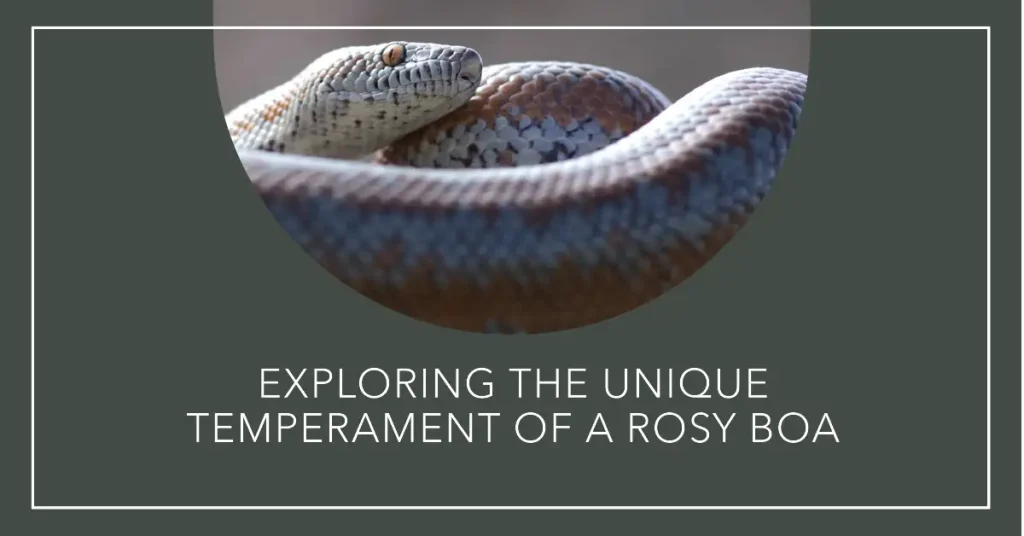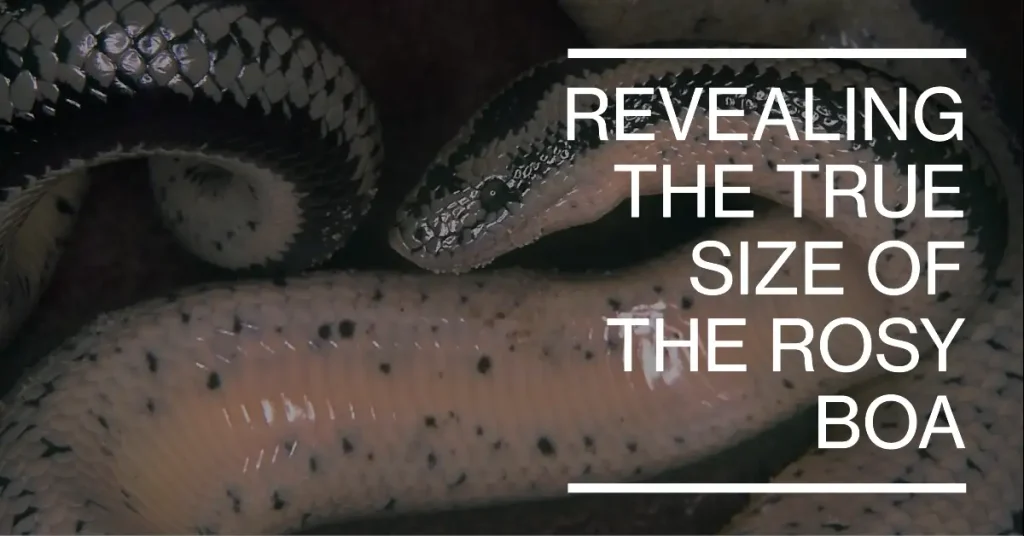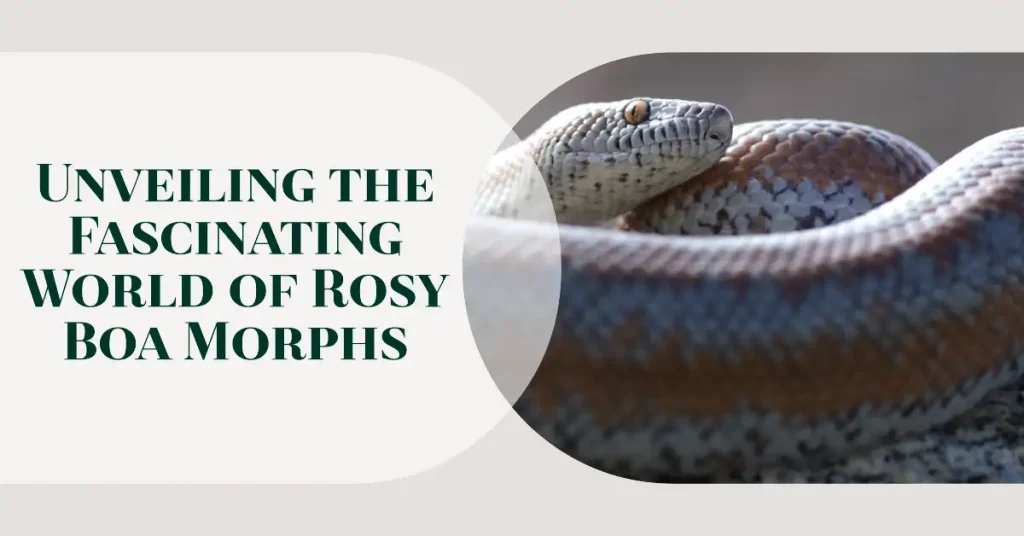I have always been fascinated by the unique personalities and behaviors of different snake species. One of the most captivating species I have come across is the rosy boa. These gentle creatures are known for their incredibly docile temperament and friendly disposition, making them a popular choice for reptile enthusiasts of all levels.
In this article, I will explore the fascinating world of rosy boas and their friendly temperament. I will delve into their behavior patterns, discuss their unique personalities, and provide practical tips for handling and caring for these fascinating creatures. By the end of this article, you will have a comprehensive understanding of rosy boas’ temperament and why they make fantastic reptile pets.
Key Takeaways:
- Rosy boas are known for their friendly and docile temperament.
- Understanding their behavior patterns and personalities is crucial to providing a suitable environment.
- Proper handling techniques and responsible ownership are essential for fostering positive interactions with rosy boas.
Understanding Rosy Boa Behavior
As reptiles, rosy boas have natural behavioral tendencies that can be interesting and unique. To properly care for a rosy boa, it’s important to understand their behavior patterns and characteristics.
Typical Behavior Patterns
Rosy boas are known for their preference for burrowing, often spending much of their time in underground tunnels they create themselves or find in their environment. They are also nocturnal, meaning they are most active during the night and sleep during the day.
In terms of their interactions with humans, rosy boas are generally docile and don’t show aggression. They usually prefer to hide or move away when they feel threatened instead of attacking.
Instinctual Behaviors
As with any animal, rosy boas have instinctual behaviors that are part of their survival mechanisms. They may have a tendency to hide or burrow to avoid predators or regulate their body temperature.
Rosy boas may also exhibit feeding behaviors that are related to their natural habitat. For example, they may prefer to hunt at night or rely on scent to locate prey.
Interaction with Environment
Rosy boas have a strong connection to their environment and rely on it for their survival. They may respond to changes in light, temperature, or humidity levels. As pets, they require a suitable habitat that mimics their natural environment to ensure their well-being.
Characteristics of Friendly Rosy Boas
Rosy boas have gained a reputation for being some of the friendliest boas in the world of reptile pets. Their docile temperament and gentle nature make them an ideal choice for beginners and experienced reptile owners alike.
Docile nature: One of the most significant characteristics of rosy boas is their docile nature. They are generally calm and tolerant of handling, making them an excellent choice for those who enjoy interacting with their pets. This friendliness also makes them less prone to biting or aggression.
Tolerance for handling: Rosy boas are also known for their tolerance for handling. They are less likely to become stressed or agitated when being held, allowing for extended interaction times. This behavior stems from their natural inclination to seek warmth and safety, just like burrowing in the wild.
Gentle disposition: In addition to their docile and tolerant nature, rosy boas have a gentle disposition. They are not known for being overly active or aggressive, preferring to spend their time burrowing or finding a cozy spot to rest. This makes them a great pet for those who desire a low-maintenance reptile companion.
Handling Rosy Boas: Tips and Guidelines
Handling rosy boas can be a rewarding experience for both you and your pet. However, it’s important to handle them properly to ensure their safety and well-being. Here are some tips and guidelines to help you handle your rosy boa:
- Start slow: When you first get your rosy boa, give them time to acclimate to their surroundings and get used to your presence. Start by placing your hand in their enclosure and letting them investigate at their own pace. Gradually work up to picking them up, starting with just a few minutes of handling per day and increasing the time as they become more comfortable.
- Support their body: When handling your rosy boa, always support their body with both hands. They are sensitive to pressure and can be injured if not handled properly. Make sure to support their entire body, including their head and tail.
- Create a calm environment: Rosy boas are sensitive to noise and sudden movements. Avoid loud noises and sudden movements when handling them, as it can startle them and cause stress. Handle them in a quiet, calm environment to help them feel safe and secure.
- Be gentle: Rosy boas are gentle creatures and can be easily hurt if handled too roughly. Avoid squeezing or pulling on them and be gentle when placing them back in their enclosure.
- Wash your hands: Before and after handling your rosy boa, make sure to wash your hands with soap and water. This helps prevent the spread of germs and keeps your pet healthy.
- Respect their needs: If your rosy boa seems uncomfortable or stressed, don’t force them to continue being handled. Respect their needs and put them back in their enclosure if they are showing signs of stress or discomfort.
By following these tips and guidelines, you can ensure that your interaction with your rosy boa is positive and enjoyable for both of you. Remember, rosy boas are docile and friendly creatures that make great pets for reptile enthusiasts of all levels.
The Care and Maintenance of Rosy Boas
Proper care and maintenance are essential for the health and happiness of your rosy boa. Here are some vital aspects to consider.
| Aspect | Requirement |
|---|---|
| Habitat | Your rosy boa should live in a spacious and secure enclosure, with a substrate that allows for burrowing. Provide hiding spots and climbing structures, as well as a water dish that is large enough for soaking. |
| Temperature and Humidity | Rosy boas require a temperature range of 75-85°F during the day and 65-75°F at night. Maintain a humidity level of 40-60% by misting the enclosure regularly and providing a humid hide. |
| Feeding | Rosy boas are carnivorous and should be fed appropriately sized prey items, such as mice or rats. Feed juveniles every 5-7 days, and adults every 10-14 days. Ensure that their food is properly thawed and at the correct temperature before offering it. |
| Health Considerations | Regular vet check-ups are crucial to ensure your rosy boa is healthy and free from common ailments such as mites or respiratory infections. Keep an eye out for signs of illness such as lethargy, loss of appetite, or abnormal behavior. |
Following these care guidelines will help keep your rosy boa happy and healthy for years to come.
The Personality of Rosy Boas
One of the most fascinating aspects of rosy boas is their unique personalities. While they are generally friendly and docile, each individual boa exhibits its own traits and quirks that make them stand out.
Some rosy boas are more outgoing and curious, while others may be more shy and reserved. Some may love to explore their environment, while others may prefer to burrow and hide. Getting to know your rosy boa’s personality is one of the joys of owning one of these gentle snakes.
It’s important to note that rosy boas do have a wild instinctual side, and they may exhibit hunting behaviors even when in captivity. However, this is completely normal and should not be cause for concern. With proper handling and care, rosy boas can learn to trust their owners and display their friendly personalities.
If you’re looking for a reptile pet with a unique and lovable personality, a rosy boa may be the perfect choice for you.
The Disposition of Rosy Boas
As I mentioned earlier, rosy boas are known for their docile and friendly nature. Their disposition is generally calm and gentle, making them a great choice for reptile enthusiasts of all levels. They have a high tolerance for handling and are less likely to become aggressive or defensive compared to other species of boas.
Rosy boas are also known for their adaptability and ease of care. They are more comfortable in small enclosures and do not require elaborate or expensive setups. Their naturally calm demeanor makes them a low-maintenance pet.
When it comes to interacting with their environment, rosy boas are curious but not overly active. They prefer to burrow and hide during the day and become more active at night. Their inquisitive nature makes them interesting to observe, but their calm disposition makes them easy to handle.
Overall, rosy boas are well-suited for captivity and make great pets for those who want a low-maintenance and friendly reptile companion.
Rosy Boa Temperament vs. Other Boa Species
When it comes to temperament, rosy boas stand out from other boa species. While many boas can be quite large and intimidating, rosy boas are known for their docile and friendly nature. They are smaller in size than other boas, which makes them more manageable for first-time reptile owners.
Compared to other boas, rosy boas are less likely to show aggression or defensive behavior when handled. They are generally more tolerant of being picked up and held, making them a great choice for those who enjoy interacting with their pets.
While some boas can become habituated to handling, rosy boas are often more receptive to it from the start. They are less prone to stress and anxiety, which means they are less likely to bite or lash out in response to unfamiliar stimuli.
While other boas may have more varied personalities, rosy boas are consistently calm and gentle. They make excellent pets for those who want to interact with their reptiles on a regular basis.
Promoting Positive Interactions with Rosy Boas
As I’ve discussed throughout this article, rosy boas are known for their friendly and docile nature. Building a strong bond with your rosy boa is an essential part of responsible pet ownership. Here are some tips for promoting positive interactions:
- Build Trust: Rosy boas thrive when they feel safe and secure. Spend time with your boa regularly and handle them gently. Over time, they will learn to trust you, making it easier to handle them and care for them.
- Create a Routine: Consistency is key when it comes to your rosy boa’s care. Establishing a routine for feeding, handling, and cleaning not only helps your boa feel more comfortable, but it also allows you to monitor their health and behavior more closely.
- Provide Enrichment: Just like any other pet, rosy boas need stimulation to keep them healthy and happy. Consider adding hiding spots and climbing structures to their enclosure, and vary their diet to keep things interesting.
By following these tips, you’ll be well on your way to fostering a strong and positive relationship with your rosy boa.
Responsible Ownership of Rosy Boas
As a rosy boa owner, it is essential to be aware of the responsibilities that come with pet ownership. Providing proper care and a suitable environment is crucial to ensure your rosy boa’s well-being and happiness.
First and foremost, you must prioritize the health of your rosy boa. Regular visits to a reptile veterinarian are crucial to maintain their health and catch any issues early on. You should also be aware of the signs of common ailments, such as respiratory infections and mites, and seek veterinary attention immediately if you suspect anything is wrong.
Additionally, proper husbandry is paramount to your rosy boa’s health. Ensure their enclosure is clean and adequately sized, with appropriate substrate and hides. The proper temperature and humidity levels must also be maintained, as these affect your rosy boa’s health and behavior.
As a responsible pet owner, you must also commit to providing a suitable diet for your rosy boa. Rosy boas are carnivorous, and their diet consists mainly of appropriately sized rodents. Offering a diverse diet and ensuring the food is nutritionally balanced is essential to keep your rosy boa healthy.
Finally, it is crucial to be committed to your rosy boa’s overall well-being. Enriching their environment with decorations and toys, creating a routine, and providing regular social interactions can aid in fostering a strong bond between you and your rosy boa.
By committing to responsible ownership and providing proper care, you can ensure your rosy boa’s longevity and happiness. These gentle, friendly reptiles deserve the best possible care and attention, and by being a responsible owner, you can provide just that.
Conclusion
In conclusion, rosy boas are known for their friendly and docile nature, making them fantastic reptile pets for enthusiasts of all levels. Throughout this article, I have discussed their behavior, temperament, and personality, offering insight into what makes them unique.
By understanding their specific care needs and providing a suitable environment, owners can promote positive interactions and establish a strong bond with their rosy boa. It is crucial to be a responsible pet owner, ensuring their well-being through proper husbandry and regular veterinary care.
Overall, rosy boas stand out as a particularly friendly and docile species among other boas. If you are considering a reptile pet, I highly recommend considering a rosy boa for their gentle disposition and fascinating behavior.
FAQ
Q: What is the temperament of rosy boas?
A: Rosy boas are known for their friendly nature and docile temperament.
Q: What are some common behavior patterns of rosy boas?
A: Rosy boas typically prefer burrowing and are nocturnal in nature. They exhibit instinctual behaviors and interact with their environment.
Q: What characteristics make rosy boas friendly?
A: Rosy boas are known for being docile, tolerant of handling, and overall gentle in disposition.
Q: What are the tips for handling rosy boas?
A: To handle rosy boas safely and effectively, it is important to gradually acclimate them, provide proper support techniques, and create a calm environment.
Q: What are the care requirements for rosy boas?
A: Rosy boas require specific habitat conditions, including temperature and humidity needs. Additionally, their feeding habits and overall health should be monitored.
Q: Do rosy boas have unique personalities?
A: Yes, rosy boas exhibit individualistic traits and can have varying personalities.
Q: What is the overall disposition of rosy boas?
A: Rosy boas are generally well-suited for captivity, tolerant of handling, and exhibit specific reactions to different stimuli.
Q: How do rosy boas’ temperament compare to other boa species?
A: In comparison to other boa species, rosy boas are particularly known for their friendly and docile temperament.
Q: How can positive interactions with rosy boas be promoted?
A: Building trust, creating a routine, and providing enriching environments are key to fostering positive interactions with rosy boas.
Q: What are the responsibilities of owning a rosy boa?
A: Responsible ownership of rosy boas includes proper husbandry, regular veterinary care, and providing a suitable environment for their well-being.
Q: What is the overall temperament of rosy boas?
A: In conclusion, rosy boas have a friendly nature and are known for their docile temperament, making them fantastic reptile pets.
Featured image: Athene cunicularia (talk) 16:35, 28 March 2008 (UTC), CC BY-SA 3.0, via Wikimedia Commons


